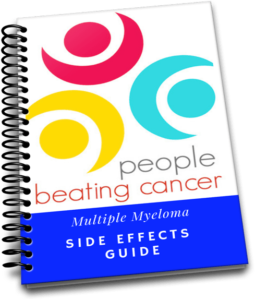The conversation with your doctor still rings in your ears. “You have multiple myeloma (MM)…” That conversation seems like it was a lifetime ago.
Though your life has changed forever you have come along way. Your hair has grown back, your scars have healed and you are working to adjust to the new normal. I am both a long-term MM survivor and MM coach. I live with the long-term and late stage multiple myeloma side effects discussed below. A growing number of studies cite MM patients living longer than ever before. That’s the good news. The bad news is that long-term survivors like me can experience late stage MM side effects.
The key is to understand how to identify and prevent late stage side effects of those therapies that have lead to your long-term MM surival.

This list of late stage MM side effects is not conclusive. To research therapies for long-term and late stage side effects that you may be wondering about, scroll down the page, post a question or comment and I will reply ASAP.
Can you put your MM behind you? Well, sort of. Let me explain.
- Your MM will relapse eventually but it doesn’t have to
- You may develop a treatment-related secondary cancer
- Your chemotherapy regimens probably left you infertile
- MM-related post-traumatic stress can develop at any time
- Chemotherapy-induced cardiotoxicity may rear it’s ugly head years after treatment
Any of these health issues can occur years after your original cancer treatment.In the case of chemo-induced infertility, you were rendered infertile during therapy but you may only learn about it when you try to conceive.
As a long-term multiple myeloma survivor I consider all of the above to be late-stage side effects. Yes, I have put my active MM treatment behind me but I have lots of other treatment-related issues to think about.
What do studies say about late stage cancer side-effects
1,2) Multiple Myeloma diagnosis, relapse or secondary cancer- Preventing cancer in general whether it’s a primary, a relapse or secondary cancer, in my experience it is all about prevention. Nutrition, moderate regular exercise, nutraceuticals all have shown the ability to reduce the risk of cancer.
3) Chemotherapy-induced infertility- not only do I link studies that cite therapies like cryopreservation of semen to prevent infertility but I can also speak from experience. My chemotherapy and radiation left me infertile. Fortunately I stored some of my sperm and when the time was right… well, my son is about to get his driver’s license.
4) Cancer related post-traumatic stress. All I can say about this possible late stage effect is that I spent a couple of years talking to a psychologist about my cancer and I still live in fear of a cancer relapse. I believe that talk-therapy helped my manage my PTSD. But it is still in my head. For me, the more I learn about cancer the better I feel, mentally and physically.
5) Chemotherapy-induced heart damage– The last two studies linked and excerpted below explain that late stage side effect of chemotherapy-induced heart damage can be mitigated if the cancer patient supplements with CoQ10, omega 3 fatty acids, Taurine, etc. in conjunction with chemotherapy.
This list of late stage MM side effects is not conclusive. To research therapies for long-term and late stage side effects that you may be wondering about, scroll down the page, post a question or comment and I will reply ASAP.
thank you,
David Emerson
- MM Survivor
- MM Cancer Coach
- Director PeopleBeatingCancer
Recommended Reading:
“Development of secondary neoplasia after successful chemotherapy and/or radiotherapy treatment can occur. The most common secondary neoplasm is secondary acute myeloid leukemia, which develops primarily after treatment with alkylating agents or topoisomerase inhibitors.[82] Survivors of childhood cancer are more than 13 times as likely to get a secondary neoplasm during the 30 years after treatment than the general population.[83] “
“Some types of chemotherapy are gonadotoxic and may cause infertility…
Patients may choose between several methods of fertility preservation prior to chemotherapy, including cryopreservation of semen, ovarian tissue, oocytes, or embryos…”
“Patients dealing with cancer may have symptoms of post-traumatic stress at any point from diagnosis through treatment, after treatment is complete, or during possible recurrence of the cancer. Parents of childhood cancer survivors may also have post-traumatic stress…”
“Many antitumor drugs cause “on treatment” cardiotoxicity or introduce a measurable risk of delayed cardiovascular events…
Cardiovascular events may occur also with other chemotherapeutics, but the dose or metabolism dependence of such events are less obvious and predictable. Drugs targeted to tumor-specific receptors or metabolic routes were hoped to offer a therapeutic gain while also sparing the heart and other healthy tissues; nonetheless, many such drugs still cause moderate to severe cardiotoxicity…”
“Preclinical and clinical studies suggest that anthracycline-induced cardiotoxicity can be prevented by administering coenzyme Q10 during cancer chemotherapy that includes drugs such as doxorubicin and daunorubicin.
Studies further suggest that coenzyme Q10 does not interfere with the antineoplastic action of anthracyclines and might even enhance their anticancer effects…
Coenzyme Q10, an essential component of the electron transport system and a potent intracellular antioxidant, appears to prevent damage to the mitochondria of the heart, thus preventing the development of anthracycline-induced cardiomyopathy.”



